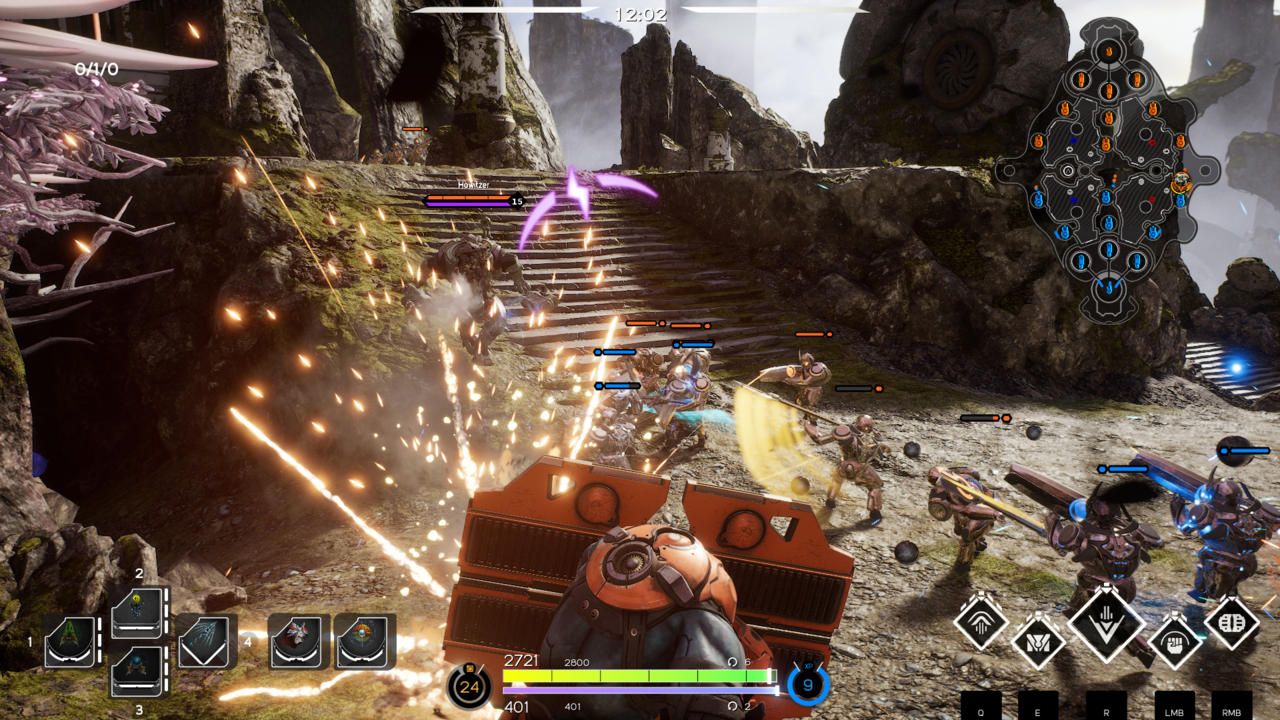Paragon is freckled with hints of Epic Games' past. Its team-based encounters hearken back to Unreal Tournament, its third-person combat feels rooted in Gears of War--its emergent, unfolding scenarios even show remnants of Bulletstorm. As executive producer John Wasilczyk tells it: Paragon is a natural part of Epic's evolution.
"We knew we wanted to make a MOBA," he said during a recent demo in San Francisco. "We're taking the studio's history, and using it to make something different in what we think is a compelling genre."
I myself have only spent about 80 total hours playing titles such as DOTA 2 and League of Legends. But as an amalgam of the past, Paragon is well-equipped to bring in players not traditionally inclined toward MOBAs. Its over-the-shoulder controls are the gateway to its underlying systems: tactics unfold much like they might in any other MOBA, but the toolset is more familiar, its initial objectives more approachable for rookie players.
Because of my inexperience relative to my teammates during the first match, I chose Rampage, a character Epic describes as a "pure tank." This hulking, Lovecraftian beast with a beard of tentacles and a gorilla's quadrupedal gait isn't equipped to do much damage. But he can take it tenfold. In essence, I chose to be a nuisance to the enemy team--a huge distraction.
The Outlast Trials | Toxic Shock Limited-Time Event and Update Trailer Life Eater - Official Launch Trailer Devil May Cry: Peak Of Combat | Vergil: Count Thunder Returns Gameplay Trailer The Complete FALLOUT Timeline Explained! Warhammer 40k: Darktide - Path of Redemption | Update Trailer Is Fallout 76 Good in 2024? Mortal Kombat 1 – Official Invasions Season 5 Gameplay Trailer Honkai: Star Rail - Official Aventurine Trailer | "The Golden Touch" SAND LAND - Official Darude Sandstorm Trailer No Rest for the Wicked - Official Steam Early Access Launch Trailer Battlefield 2042 | Frontlines Mode Returns - Time-Limited Event Trailer 21 Details You May Have Missed In Helldivers 2
Please enter your date of birth to view this video
By clicking 'enter', you agree to GameSpot's
Terms of Use and Privacy Policy
We spawned at our base, and I grasped the controls from the outset. Within seconds, I was sprinting down the left lane toward the enemy team's first tower, smashing creeps, and gaining experience along the way.
Paragon's action-oriented controls manifested in several cases: Rampage's Pounce attack, coupled with his Roar ability, sent me careening through the air, over rocky crags, until I pulled the trigger to land with a violent smack in a group of enemy minions.
My Boulder power exemplified Paragon's action-skill requirement to an even higher degree. By reaching into the earth below my feet, ripping a chunk free, and carrying it to an ideal position atop a nearby cliff, I could take aim and hurl my rock at the enemy team. It felt much like throwing a grenade in Gears of War.
You'd be surprised how some of these action elements translate. It's a process of playtesting and discovery.
"You end up being surprised at how some of these things translate," Wasilczyk said. "Some work, some don't, some do things you never thought they would. It's a process of playtesting and discovery."
After stunning an enemy hero with my boulder so my teammate's Sparrow character could finish the job with her bow, I descended into the map's sunken jungle to buff my team. Paragon's jungle--the area in between lanes with its own neutral creeps--lies lower than its three surrounding pathways for a couple of reasons.
First: it adds verticality to the arena. I came across several enemy heroes in the jungle, only to realize that their higher elevation made me a prime target for attack. Second: the jungle plays a prominent role in Paragon's moment-to-moment combat itself. On numerous occasions, I used the tight corridors and confusing turns to lose a pursuing opponent as my health dipped.

But still, despite Paragon's frantic moments and emergent combat scenarios, it is very much a MOBA. As such, it runs the risk of repeating the shortcomings of others in the genre. But Epic is hoping to avoid them.
As in many MOBAs, spending resources on the most useful items is paramount in any given Paragon match. But this aspect of the genre is also often the most daunting obstacle to new players, with an array of items available at any given time, and dozens of options that could turn out to be useless as the match progresses.
Paragon's deck-builder is Epic's possible solution to that problem. It allows players to build their item set before they enter a match, dictating which buffs and equipment will be available throughout the upcoming encounter. New players have a starter deck to lay the foundation. But as they progress, and learn each character, they can swap out simpler cards for ones with more complex permutations. Epic wants to leave open various avenues for experimentation.
"We're trying to make a constantly evolving experience," Wasilczyk said. "Something where no two matches play out the same. Players will learn new patterns with each character. There's always something new to learn, something new to grow into and perfect."
It's tough to make something different. But that's what we're aiming for.
Time will tell if Epic can capitalize on its past as it moves into a new phase of its existence. From what I played, though, Paragon does feel like something fresh in a genre that grows by the month, with numerous new eSports deals bringing MOBAs to a constantly growing stage.
Esports are a consideration at the moment, Wasilczyk said, but not Epic's main focus. "That's up to the community. Right now, we're just trying to make the best game possible from what we've learned. That's a tough thing to do, and it's tough to make something different. But that's what we're aiming for."

